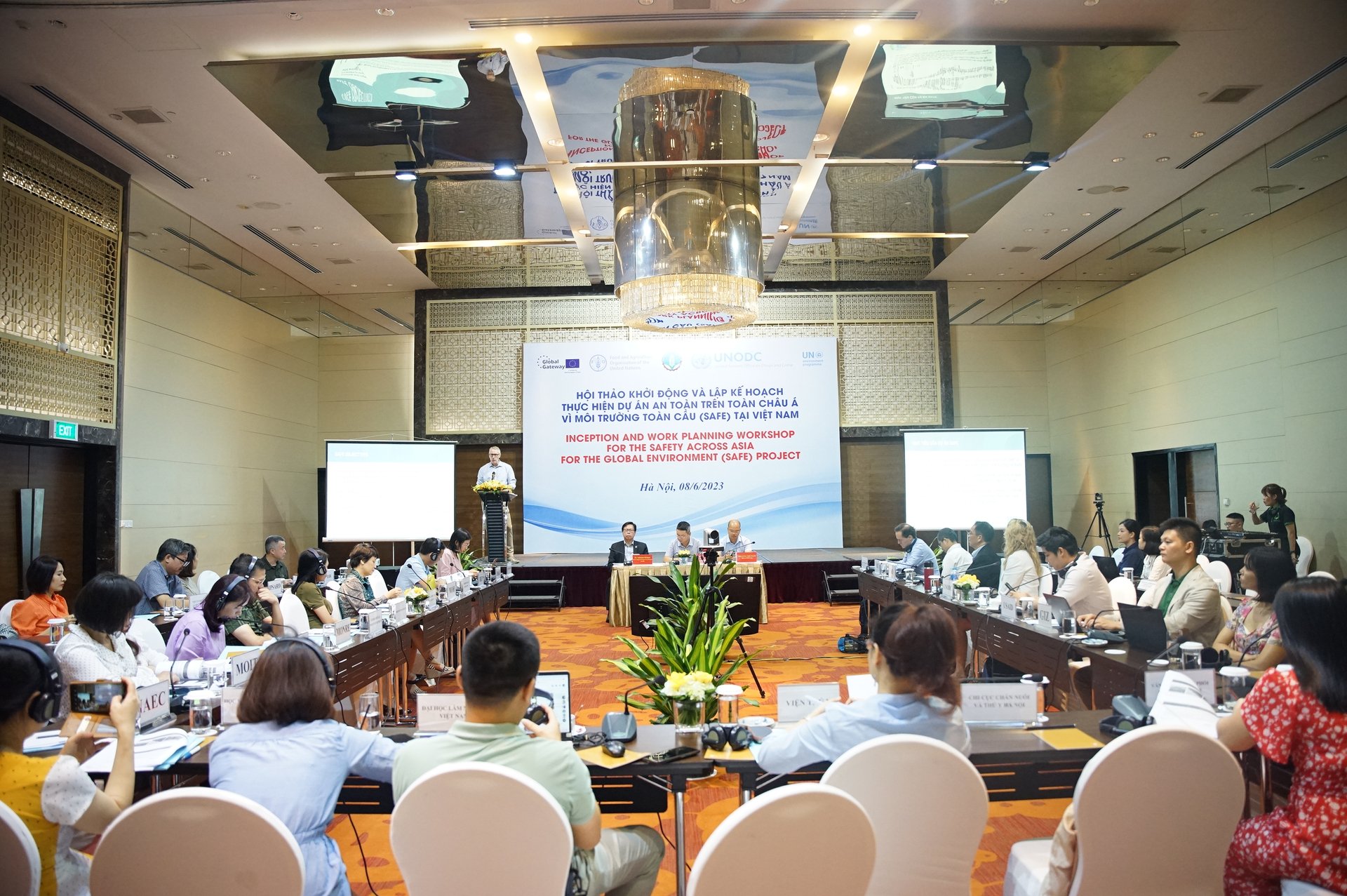November 27, 2025 | 18:02 GMT +7
November 27, 2025 | 18:02 GMT +7
Hotline: 0913.378.918
November 27, 2025 | 18:02 GMT +7
Hotline: 0913.378.918

The SAFE project was conceived with the express objective of reducing the risks of future pandemics by focusing on the health and crime risks associated with wildlife facilities. Photo: Linh Linh.
In recent years, the world has been threatened by the emergence and spread of emerging and re-emerging infectious diseases in humans, domesticated animals, and untamed animals. These diseases are the result of interactions between humans, animals, and ecosystems and have the potential to have devastating effects on human health, livelihoods, economic development, and more. According to scientific evidence compiled by the World Health Organization, approximately 70% of emergent harmful infectious diseases in humans are of animal origin.
The Covid-19 pandemic has increased awareness of diseases transmitted from wild animals to domestic animals and humans, the dangers of consuming bushmeat, and global health security. In contrast, trade in wildlife is becoming an important source for livelihood in many Southeast Asian nations.
Vu Thanh Liem, Deputy Director of the International Cooperation Department (MARD), stated that the EU-funded SAFE project is chaired by the United Nations Office on Drugs and Crime (UNODC), and its co-implementing partners include the United Nations Environment Programme (UNEP) and the Food and Agriculture Organization of the United Nations (FAO).

Mr. Vu Thanh Liem, Deputy Director of the International Cooperation Department (MARD) spoke at the workshop. Photo: Linh Linh.
The Ministry of Agriculture and Rural Development via the Authority to administer the Convention on International Trade in Endangered Species of Wild Fauna and Flora (CITES) as the project proprietor and the International Cooperation Department and One Health Coordinator office are the government partners. The objective of the project is to mobilize multisectoral participation in consultation and cooperation with countries in the region in order to prevent and reduce the risk of disease transmission from untamed animals in wildlife facilities.
Vuong Tien Manh, the Deputy Director of CITES, determined that the initiative is consistent with Vietnam's priorities and policies on wildlife protection in accordance with Directive No. 29/CT-TTg of the Prime Minister on a number of urgent wildlife management solutions. "The initiative employs a One Health approach, mobilizing multi-sectoral and multi-governmental agencies to control and prevent domestic and international wildlife trafficking. Manh stated that the initiative solicits the participation of relevant government agencies in the review of domestic and transboundary wildlife management policies and mechanisms.
In addition, the CITES representative explained that the project's responsibility to control wildlife maladies is one of the six primary duties of the One Health Partnership Framework. "Over the years, the Vietnamese government has bolstered surveillance systems, promoted responsible wildlife trade practices while protecting livelihoods, increased biosecurity on wildlife farms and markets, and raised awareness about zoonotic diseases. This initiative will bolster our efforts and assist us in enhancing the management of captive fauna in accordance with the proposed national plan, as stated by Manh.
Efforts are also being made to strengthen collaboration between the public health, veterinary, and environmental sectors as part of the One Health philosophy. Jenna Dawson-Faber, the coordinator of the UNODC SAFE project, stated, "The SAFE project was conceived with the express purpose of reducing the likelihood of future pandemics by concentrating on health and crime hazards associated with wildlife facilities. Ms. Jenna stated that in order to attain this objective, it is necessary to collaborate and involve all stakeholders.
FAO Viet Nam presented the SAFE project at the One Health Summit in August 2022 and elaborated on it at the pandemic working group (PWG) meeting in January 2023.
The initiative seeks to contribute to the control of illegal wildlife trade and wildlife diseases, as well as to the implementation of best practices throughout the value chain and the production of animal products.
With the start of these activities, Vietnam joins the other SAFE countries of Lao PDR, Thailand and Sabah State of Malaysia in full project implementation. National Advisory Committees have already been established in Thailand and Lao PDR, and data collection is well underway in Thailand and Sabah, with Lao PDR to begin in the coming days.
It seeks to strengthen coordination between government stakeholders (Ministry of Health, Ministry of Natural Resources and Environment, Ministry of Industry and Trade, etc.) and public and private sector stakeholders involved in wildlife value chains and private sector participation in disease control using a One Health approach, thereby strengthening and expanding regional and international cooperation on One Health.
Translated by Dieu Linh

(VAN) According to Mr. Vo Minh Thanh, Director of the Tay Ninh Department of Agriculture and Environment, Resolution 57 has created a new development pathway for the locality, shifting from traditional toward modern agriculture.
/2025/11/26/4909-2-154329_878.jpg)
(VAN) Pearl grouper farming in HDPE cages not only delivers economic efficiency but also contributes to protecting the environment, creating jobs, and promoting marine-based experiential tourism.

(VAN) The model of making a living under the forest canopy through the agroforestry system in Van Son commune, Bac Ninh province, is expected to generate an annual income of approximately VND 30 million/ha.

(VAN) Many enterprises in Can Tho are harnessing natural energy and reducing greenhouse gas emissions in their production processes, thereby contributing to the promotion of a sustainable green transition.
/2025/11/24/3536-2-112800_176.jpg)
(VAN) Dong Nai now has tens of thousands of hectares of forests certified for sustainable management, and this area will continue to be expanded in the coming period.

(VAN) Vinh Ha hamlet (Dai Xuyen commune, Hanoi) is shifting away from small-scale farming as households adopt bioscurity into their breeder chicken models.

(VAN) Heavy rains make aquatic species more vulnerable to disease. Proactive water management and high-tech systems help farmers prevent outbreaks and protect yields.